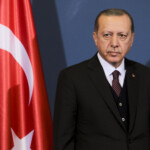In the end, the sharp demise of Turkey’s main opposition party, the CHP, is a powerful sign of the republic in an avalanche, but a daydreaming political class will be the last ones to realize and acknowledge that fact – when it is too late.
The election results, confirming Turkey’s authoritarian course, continue to expose the destruction of whatever remains of the Republic, sending out strong signals to the institutions identified with the old form of government. Right now two of them, bearing the name “cumhuriyet” [republic] in their names, face either collapse or implosion.
One of them is the daily Cumhuriyet. For decades run by a trust, and occasionally featuring strong, independent, and bold journalism, it had been a flag bearer for freedom against the military rule during the 1980’s. But after a bruising split at the editorial level it was subjected to a series of crises, lost blood, and resorted to a hard-line content policy—with shrinking readership figures. Yet despite being harassed at the hands of incompetence, it has always represented dignity and maintained the potential for independence.
But this might be coming to an end. Recently, it was shattered by a scandal which has by now led to the dismissal of its chief editor and the resignation of its online editor.
The story was simple: It appeared that three of its editors had received a considerable amount of cash in chocolate boxes for their “service” to publish an advertorial in the form of real news. The scandal was first met by silence from management.
But when the Editor wrote a column acknowledging wrongdoing, he was shocked to see that it was not allowed to be published. The day after, he was fired for this self-criticism. It is probably a unique case in press history: that an Editor-in-Chief was censored by the newspaper he was in charge of.
The scandal didn’t go away. Days after, the Editor of the online edition resigned, issuing a statement that “the act in question is indisputably true, and has caused shame from the moment it was revealed.” The management, denying any mistake, also fired a columnist who had reminded the newspaper of its ethical values.
That professional corruption has reached Cumhuriyet is perhaps no coincidence, considering the Zeitgeist keeping the crisis-ridden Turkey in its cruel grip. The media’s demise seems sped up by Erdoğan’s victory, and it seems only a matter of time before we witness a funeral ceremony for the media in general in the country.
The note bearing the Council of Europe election monitors’ signature has already made it it clear that, not only did the pro-government media fail to cover the elections freely, butthe so-called opposition media outlets also followed biased coverage patterns, leaving the public uninformed of the facts and exposing them to further polarization.
It may very well be that the daily Cumhuriyet, as old as the Republic itself and established at the suggestion of Atatürk himself, is a casualty of the overall corruption gnawing at the country. But there is another institution, again bearing the name “cumhuriyet,” that is heading into an immense identity and credibility crisis.
This is the Republican People’s Party [“Cumhuriyet Halk Partisi,” or CHP], the main loser of the elections. Although its leader, Kemal Kılıçdaroğlu, lost by a smaller margin to Erdoğan in the presidential race, the CHP remained at its historically static 25% level. The fact is that both its leader and his party tasted defeat for the 19th time in the past two decades.
In spite of this, ever since the day after the run-off, both Kılıçdaroğlu and his close circles remain in staunch denial, some even stating that “we haven’t lost.” After a couple of days in silence and confusion, Kılıçdaroğlu—according to various insider sources I spoke to—ignored the advice that he come out and face the voters, be accountable for his mistakes, and, as some have suggested, resign.
He did the opposite, defending himself in terms and arguments (“tell me if I didn’t work hard enough,” etc.) —none of which sound convincing to the public. These days, with two weeks having passed, Kılıçdaroğlu seems to have ascertained himself that he has the ground and support of his allies in the party’s elite to remain leader.
This is a common pattern of the CHP, often accused of ideological and institutional corruption—that because of its attractive assets, whoever comes to the top never leaves. Resignation due to election defeat has never had a place in its institutional vocabulary.
This tendency has always caused critics to label the CHP as an elite club rather than a representative party—a group that is more interested in satisfying the interests of a rotten political class whose aim has never stretched beyond being elected as a high-salaried deputy in Parliament.
One of these major critics, who didn’t mince words, was a veteran figure of the Turkish centre left: the late Tarhan Erdem. Founder of the respected pollster KONDA, Erdem has told me in private that the emergence of an alternative, true social democratic party would only be possible, “when loyal CHP voters finally and for good decide to delete the party from their minds.”
Now, it seems, the CHP is closer than ever to facing abandonment by its long-loyal electorate base. Kılıçdaroğlu and his circles in the elite may have decided to live in illusion for another five years, conducting a “quasi-opposition” in a functionless, rubber-stamp Parliament. But their alienation from the deeply disappointed voter base will continue to develop. We may forget all the glitzy rhetoric by Kılıçdaroğlu about a prospective victory in the local elections in the spring of 2024, it will likely be a Herculean task for his party to take the voters to the ballot boxes at all.
In the end, the sharp demise of Turkey’s main opposition party, the CHP, is a powerful sign of the republic in an avalanche, but a daydreaming political class will be the last ones to realize and acknowledge that fact – when it is too late.
The views and opinions expressed above are the author’s and do not reflect those of the Free Turkish Press.


